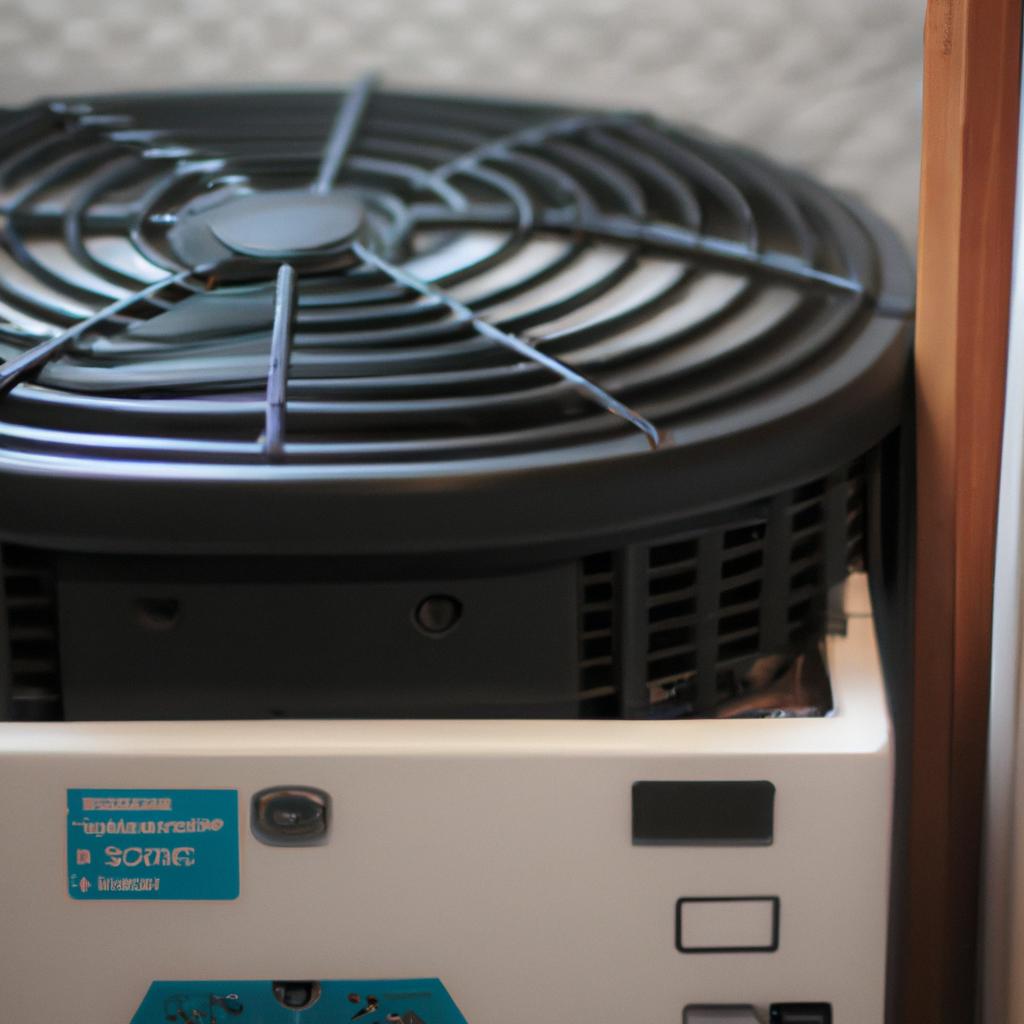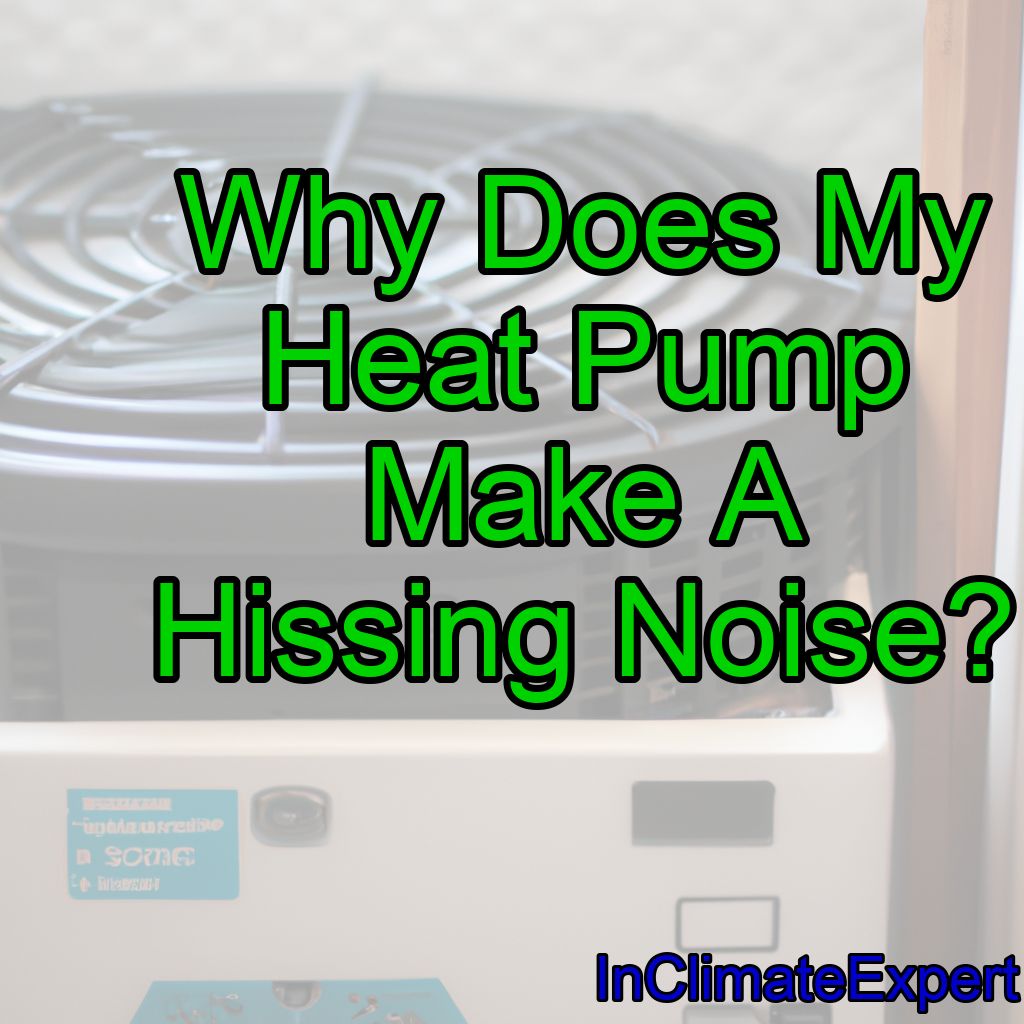Have you ever noticed a hissing noise coming from your heat pump?
Your heat pump may make a hissing noise due to a few potential reasons:
1. Refrigerant leak: The most common cause of a hissing noise is a refrigerant leak in the system. This can occur in the coils, valves, or connections, and may require a professional technician to locate and repair the leak.
2. Expansion valve: The expansion valve regulates the flow of refrigerant in the system. If it’s malfunctioning or stuck, it can create a hissing noise as the refrigerant passes through it at high pressure.
3. Defrost cycle: During the defrost cycle, the heat pump may produce a hissing noise as it shifts between heating and cooling modes. This is normal and should stop once the cycle is complete.
4. Air in the system: If air gets trapped in the refrigerant lines, it can cause a hissing noise as it moves through the system. This may require a technician to purge the air from the lines.
If the hissing noise persists or worsens, it’s best to consult a professional technician to diagnose and address the issue, as it may indicate a more serious problem with your heat pump.
While some noises are normal, a continuous or loud hissing sound could be an indication that something is wrong.

Understanding why your heat pump is making this noise can help you determine if it’s a simple fix or if you need to call in a professional.
The hissing sound could be caused by a few different things, such as refrigerant leaks, clogged filters, or issues with the compressor.
It’s important to identify and address the source of the hissing noise as soon as possible to prevent further damage and ensure your heat pump is running efficiently.
In this article, we will explore the common reasons why your heat pump may be making a hissing noise and what steps you can take to resolve the issue.
Common Causes Of Hissing
If you hear a hissing noise coming from your heat pump, it can be quite alarming.
However, this sound is actually quite common and can have several different causes.
One possible reason for the hissing noise is that there may be a refrigerant leak in the system. Refrigerant leaks are not only noisy but can also be dangerous, as refrigerants are harmful to the environment.
Another potential cause of a hissing sound is that there may be an issue with the compressor or expansion valve within your system. These components are responsible for regulating the flow of refrigerant through your heat pump, so if they become damaged or malfunctioning, they can create a hissing noise.
While these issues can typically be repaired by a professional HVAC technician, it’s important to address them sooner rather than later to prevent more significant problems down the road.
Moving on to signs of potential issues with your heat pump…
Signs Of Potential Issues
If you notice your heat pump making a hissing noise, it could be a sign of potential issues. Don’t ignore this sound as it can indicate that something is not functioning correctly within the system.
Here are some other signs to look out for:
Firstly, if you notice that your heat pump is blowing cold air instead of warm air, it could be a sign of a refrigerant leak or compressor failure.
Secondly, if you see ice forming on the outdoor unit or hear strange noises coming from the indoor unit, it may indicate an issue with the fan motor or blower.
To troubleshoot these potential issues, there are several steps you can take before calling in a professional technician.
These steps include checking your thermostat settings, inspecting and cleaning the air filters, and ensuring that all vents and registers are clear from obstructions.
By taking these initial troubleshooting steps, you may be able to identify and resolve minor problems on your own before they become major issues.
Troubleshooting Steps
First, let’s check the ventilation to make sure it’s not blocked.
Then, we should inspect the heat exchanger to see if it’s causing the noise.
Finally, we should check for leaks that could be making the hissing sound.
Check The Ventilation
If you are experiencing a hissing noise coming from your heat pump, one possible solution is to check the ventilation.
This noise could be due to restricted airflow caused by dirty air filters or blocked vents.
If the air filters are clogged, the heat pump may have to work harder than it should, leading to increased energy consumption and inefficient heating or cooling.
Ensure that the air filters are clean and replace them if they are dirty.
Also, check that all the vents in your home are open and not obstructed by furniture or other objects.
Proper ventilation will ensure that your heat pump operates efficiently and quietly without any hissing noises.
Inspect The Heat Exchanger
Now that you have checked the ventilation, another possible solution to a hissing noise from your heat pump is to inspect the heat exchanger.
A damaged or clogged heat exchanger can cause the refrigerant to leak and create a hissing sound.
To inspect the heat exchanger, turn off the power supply to the unit and remove the access panels.
Carefully examine the heat exchanger for any signs of damage or corrosion.
Clean it with a soft brush or compressed air if it is dirty.
If you notice any cracks or leaks, it is best to call a professional technician to repair or replace the heat exchanger.
By inspecting and maintaining a clean and functioning heat exchanger, you can ensure that your heat pump operates efficiently and without any unwanted noises.
Check For Leaks
Now that we have covered inspecting the heat exchanger, another step in troubleshooting a hissing noise from your heat pump is to check for leaks.
Leaks can occur in the refrigerant lines and cause a hissing or bubbling sound.
To check for leaks, turn off the power supply to the unit and inspect the refrigerant lines for any visible damage or corrosion.
You can also use a leak detector to locate any small leaks that may not be visible.
If you do find a leak, it is important to call a professional technician to repair it as soon as possible.
By regularly checking for leaks and addressing them promptly, you can ensure that your heat pump operates safely and efficiently.
Professional Assistance
After attempting some basic troubleshooting steps, such as checking the air filter and ensuring proper power supply, if your heat pump is still making a hissing noise, it may be time to seek professional assistance.
Attempting to fix the issue on your own could potentially do more harm than good and end up costing you more money in the long run.
Here are three reasons why seeking professional assistance is recommended:
- Safety: Heat pumps operate using high voltage electrical systems and refrigerant gases that can be dangerous if mishandled.
- Experience: HVAC professionals have the necessary training and experience to properly diagnose and repair issues with heat pumps.
- Warranty: Attempting DIY repairs or hiring an unqualified technician could void your warranty, leaving you responsible for all repair costs.
Don’t hesitate to contact a licensed HVAC professional for assistance with your hissing heat pump.
They will be able to accurately diagnose the issue and provide a safe and effective solution that will save you time and money in the long run.
Conclusion
In conclusion, if your heat pump is making a hissing noise, it’s important to identify the cause and take action to prevent further damage.
As we have discussed, there are several common causes of this issue, including refrigerant leaks, clogged filters, or a malfunctioning compressor.
If left untreated, these problems can lead to decreased efficiency and even complete system failure.
It’s crucial to pay attention to any signs of potential issues with your heat pump, such as reduced heating or cooling performance or unusual sounds. By taking quick action and following simple troubleshooting steps like cleaning or replacing filters or checking for visible leaks, you may be able to resolve the problem on your own.
However, if you’re unsure about how to proceed or suspect a more serious issue with your heat pump, it’s always best to seek professional assistance.
An experienced HVAC technician can diagnose the problem and recommend the best course of action to ensure your system operates safely and efficiently for years to come.




